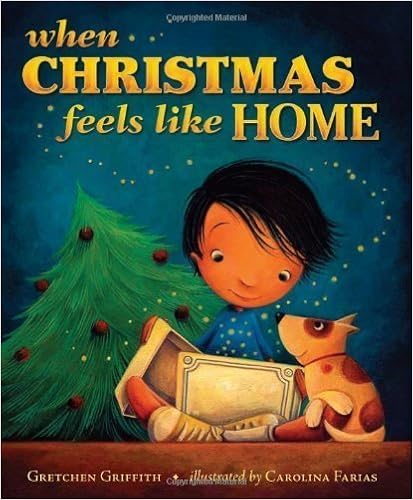
Christmas, more than any other season, finds our minds
wandering back to our growing up years and special Christmas memories with family and friends. It happens no matter your years or the miles that now separate you from your loved ones. It's a time when a picture or a song or a smell can transport you to grandma's kitchen where you helped bake cinnamon cut-out cookies or the whiff of pine needles transports you to the farm where you'd tromp through the snow to find and cut the perfect tree.
Creating new memories from the old is not always an easy task when you're an adult. It has to be doubly hard and confusing for a child. That's why the wonderful story book by Gretchen Griffith, When Christmas Feels Like Home, is a must read for children and grandchildren who have been uprooted and moved away from all things familiar. This important book will open the door to conversations about those feelings children have difficulty expressing.
A Goodreads review puts it this way: "When Christmas Feels Like Home is more than a Christmas book. Children who have moved to a new home, across the street, across town, from town to town or country to county, will relate to Eduardo as he attempts to understand the unfamiliar, find new friends and make his new house or apartment feel like home. Ms. Griffith's use of language is both beautiful as well as visual. Children will delight in trees that stand like skeletons, pumpkins that smile, words that float on clouds and trees that ride on cars. The cute illustrations are guaranteed to capture a child's attention. When Christmas Feels Like home will surely open up communication between parents who have moved their family from place to place, and the children they love."
Nine years ago my husband and I moved to the mountains of North Carolina. Each year since, we've tried to recreate the spirit of the season in our log home. It will never been the same as the years we spent in Ohio rearing our children, but now, after nine years, we've established new memories and transported our traditions to a new location. This was something that evolved over the years until finally, in our new location, Christmas does feel like home. Still, to our daughters, now married with their own families and scattered to Alaska, Rhode Island and Pennsylvania, their idea of home for the holidays will never be the same. But, with the decorations they grew up with, now hanging on the tree in our log home, they get a small sense of that feeling of home when they visit.
What do you do to make Christmas feel like home?
******************
For more books by Gretchen Griffith
http:www.gretchengriffith.com
http://www.gretchengriffith.com/blog.htm







































